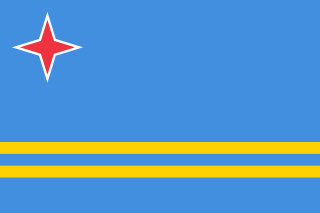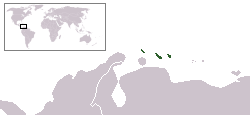
Aruba is a constituent country of the Kingdom of the Netherlands physically located in the mid-south of the Caribbean Sea, about 29 kilometres (18 mi) north of the Venezuelan peninsula of Paraguaná and 80 kilometres (50 mi) northwest of Curaçao. It measures 32 kilometres (20 mi) long from its northwestern to its southeastern end and 10 kilometres (6 mi) across at its widest point. Together with Bonaire and Curaçao, Aruba forms a group referred to as the ABC islands. Collectively, these and the other three Dutch substantial islands in the Caribbean are often called the Dutch Caribbean, of which Aruba has about one-third of the population. In 1986, it became a constituent country within the Kingdom of the Netherlands, and acquired the formal name the Country of Aruba.

The Netherlands Antilles was a constituent country of the Kingdom of the Netherlands. The country consisted of several island territories located in the Caribbean Sea. The islands were also informally known as the Dutch Antilles. The country came into being in 1954 as the autonomous successor of the Dutch colony of Curaçao and Dependencies. The Antilles was dissolved in 2010. The Dutch colony of Surinam, although it was relatively close by on the continent of South America, did not become part of the Netherlands Antilles but became a separate autonomous country in 1954. All the island territories that belonged to the Netherlands Antilles remain part of the kingdom today, although the legal status of each differs. As a group they are still commonly called the Dutch Caribbean, regardless of their legal status. People from this former territory continue to be called Antilleans in the Netherlands.

The ABC islands is the physical group of Aruba, Bonaire, and Curaçao, the three westernmost islands of the Leeward Antilles in the Caribbean Sea. These have a shared political history and a status of Dutch underlying ownership, since the Anglo-Dutch Treaty of 1814 ceded them back to the Netherlands, as Curaçao and Dependencies from 1815. They are a short distance north of the Falcón State, Venezuela. Aruba and Curaçao are autonomous, self-governing constituent countries of the Kingdom of the Netherlands, while Bonaire is a special municipality of the Netherlands. Territories of the Kingdom of the Netherlands, the countries, and its special municipalities, are outside the European Union; citizens have Dutch nationality and the former colonial power benefits from preferential trade, mineral and natural resource rights, particularly offshore.
The Netherlands Antilles national football team was the national team of the former Netherlands Antilles. It was controlled by the Nederlands Antilliaanse Voetbal Unie. The NAVU consisted of Curaçao and Bonaire. Aruba split in 1986 and has its own team.

The Charter for the Kingdom of the Netherlands is a legal instrument that sets out the political relationship between the four countries that constitute the Kingdom of the Netherlands: Aruba, Curaçao, and Sint Maarten in the Caribbean and the Netherlands in Europe. It is the leading legal document of the Kingdom. The Constitution of the Netherlands and the Basic Laws of the three other countries are legally subordinate to the Charter.

The Netherlands Antilles was an autonomous Caribbean country within the Kingdom of the Netherlands. It was dissolved on 10 October 2010.
The Council of Ministers of the Kingdom is the executive council of the Kingdom of the Netherlands, which is a state consisting of four constituent countries: Aruba, Curaçao, the Netherlands, and Sint Maarten. The Council of Ministers of the Kingdom consists of the Council of Ministers of the Netherlands complemented by one Minister Plenipotentiary of Aruba, one Minister Plenipotentiary of Curaçao, and one Minister Plenipotentiary of Sint Maarten. The Prime Minister of the Netherlands chairs the Council of Ministers of the Kingdom. Together with the King, the Council of Ministers of the Kingdom forms the Government of the Kingdom, also known as the Crown.

The Minister Plenipotentiary of Aruba represents the constituent country of Aruba in the Council of Ministers of the Kingdom of the Netherlands. The current Minister Plenipotentiary of Aruba is Guillfred Besaril. The Minister Plenipotentiary and his cabinet are seated in the Arubahuis in The Hague.

The following outline is provided as an overview of and topical guide to the Netherlands Antilles:

The Kingdom of the Netherlands, commonly known as simply the Netherlands, is a sovereign state and constitutional monarchy with 98% of its territory and population in Western Europe and with several small West Indian island territories in the Caribbean.

The following is an alphabetical list of topics related to the former nation of the Netherlands Antilles.

The Minister Plenipotentiary of Curaçao represents the constituent country of Curaçao in the Council of Ministers of the Kingdom of the Netherlands. The current Minister Plenipotentiary of Curaçao is Anthony Begina. The Minister Plenipotentiary and his cabinet are seated in the "Curaçaohuis" in The Hague.

The Minister Plenipotentiary of Sint Maarten represents the constituent country of Sint Maarten in the Council of Ministers of the Kingdom of the Netherlands. The current Minister Plenipotentiary is Rene Violenus.
A Kingdom Act is an act of the Kingdom of the Netherlands, which scope goes beyond the constituent country the Netherlands, and which is (also) effective in the other constituent countries Aruba, Curaçao and/or Sint Maarten. Kingdom Acts are used for specific areas of law set out in the Charter for the Kingdom of the Netherlands, or for those areas where countries in the Kingdom of the Netherlands cooperate voluntarily.

The Dutch Caribbean are the territories, colonies, and countries, former and current, of the Dutch Empire and the Kingdom of the Netherlands in the Caribbean Sea. They are in the north and south-west of the long Lesser Antilles archipelago.

Suriname was a constituent country of the Kingdom of the Netherlands between 1954 and 1975. The country had full autonomy, except in areas of defence, foreign policy, and nationality, and participated on a basis of equality with the Netherlands Antilles and the Netherlands itself in the Kingdom of the Netherlands. The country became fully independent as the Republic of Suriname on 25 November 1975.

The 1969 Curaçao uprising was a series of riots on the Caribbean island of Curaçao, then part of the Netherlands Antilles, a semi-independent country in the Kingdom of the Netherlands. The uprising took place mainly on May 30, but continued into the night of May 31 – June 1, 1969. The riots arose from a strike by workers in the oil industry. A protest rally during the strike turned violent, leading to widespread looting and destruction of buildings and vehicles in the central business district of Curaçao's capital, Willemstad.
Same-sex marriage in Bonaire, Sint Eustatius and Saba is legal following the entry into force of a law enabling same-sex couples to marry on 10 October 2012.
The Minister Plenipotentiary of Suriname represented the constituent country of Suriname in the Council of Ministers of the Kingdom of the Netherlands. It has existed from 1954 until the Independence of Suriname on 25 November 1975.

Efraïn Jonckheer was a businessman and politician of the Netherlands Antilles. Jonckheer served as Prime Minister of the Netherlands Antilles from 8 November 1954 until 14 February 1968. He served as Minister Plenipotentiary of the Netherlands Antilles from 1968 until 1971, Ambassador of the Netherlands to Venezuela from 1971 until 1976, and to Costa Rica from 1976 until 1982. As of 2022, Jonckheer was the longest serving Prime Minister in the history of the Kingdom of the Netherlands.










